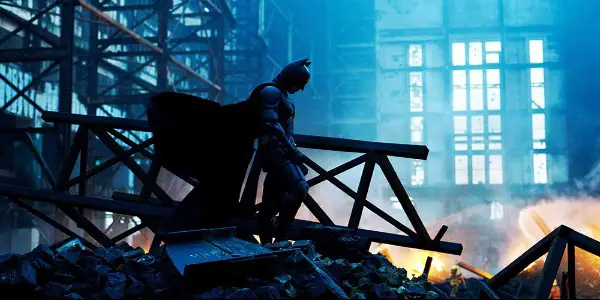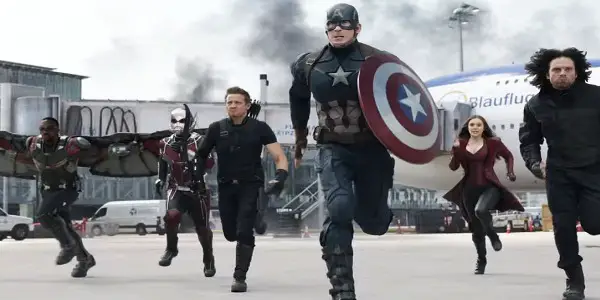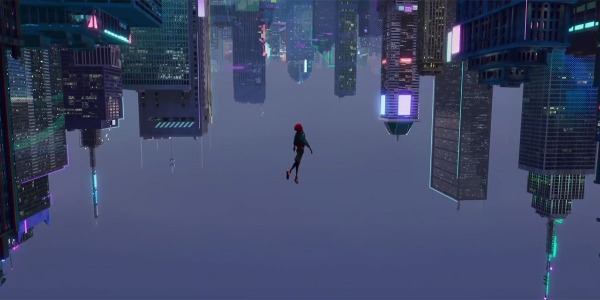From THE DARK KNIGHT Into THE SPIDER-VERSE: The Making Of The Superhero Spectrum

I once made mashed potato for Rick Astley. It's not…
2008 was the breakout year for comic-book movies. The arrival of Iron Man onto the scene birthed the MCU and The Dark Knight redefined what the genre could be. The fallow early-noughties, save for Sam Raimi’s Spider-Man, were forgotten. These two films have cast a long shadow over the cultural landscape. While Iron Man created a template which the MCU would re-purpose all the way to Doctor Strange (and perhaps Captain Marvel), the shadow of The Dark Knight has loomed larger.
Following the Caped Crusader
Christopher Nolan’s second Bat-film grounded its hero in a terse, morally ambiguous world. More so, it grounded superheroes in a post-9/11 landscape; a world where sometimes, men just want to watch the world burn. The film has been thoroughly scrutinised and studied ever since. President Obama’s claim that it helped him understand ISIS has only added to this apocryphal subtext.

Cinematically, for a long time, the superhero genre struggled to emerge from this titanic legacy. The DCEU, long-mired in the dark and gritty stylisation of Zach Snyder, grasped for a similar tone. The closest they came to this was the first half of Man of Steel, a film which starts earnestly and intriguingly, but is undermined by a bloated final act. Other attempts have been less fruitful. Batman vs. Superman underwhelmed, while Suicide Squad’s unfocused approach saw it try to appeal to too many genres at once.
Sustaining the Genre
Away from the DCEU, Marvel’s output has managed to carve its own identity. The lilting, irreverent comedy of the MCU has become a staple, even in the more prosaic, politically-charged adventures of Captain America.
There is, of course, a lot of variety within the MCU. As Director James Gunn attested when defending the ingenuity of the studio, Guardians of the Galaxy Vol. 2 “ends with a closeup of a raccoon crying because he realizes there might be a God.” Yet there are enough narrative and tonal through-threads across the films to ensure that mass ensemble pieces like Civil War and Infinity War can actually function.

As a result, if the MCU’s excellence has created the prevailing wisdom of what a comic book movie should be, then The Dark Knight is still a beacon of what they can be.
Similar attempts at iconoclasm have still operated within this spectrum. Deadpool, for all its abundant self-awareness, still has the texture (and third act) of many of its peers. The excellent Logan, a film which knowingly ruminates on the end of superheroes, still feels like a distant relative of Nolan’s Dark Knight Trilogy. These are fantastic films, but they still operate within certain cultural parameters.
A Decade in the Making
It is only in 2018, a decade after those seminal releases, that we have fully formed the superhero spectrum. Much of the credit for this must go to Avengers: Infinity War. The scope of the project was unheard of and the number of spinning plates innumerable. It didn’t just work as a cinematic project but triumphed as a soaring superhero movie. One which even had time, and audacity, to make the villain the main character and raise the stakes to cosmic levels.
Yet it is Spider-Man: Into The Spider-Verse which has truly re-drawn the parameters of the genre. It has done this, at least partly, by completely embracing the source material. From the animation’s aping of comic-book panels through to the detailed inclusion of the multiverse, Spider-Verse is an escapist joy. It doesn’t have the same desire to be sociopolitically relevant like The Dark Knight, yet it speaks directly to the greatest cultural phenomenon of the past decade: superhero movies.
On one level, you could say that Spider-Verse succeeds in breaking the mould by dint of its animation. The two areas seem like natural bedfellows, and on TV this has been the case. The success of Teen Titans, Batman, or even the 1960’s Spider-Man series all attest to the suitability of animation for comic-book fare.

Beyond the visuals, Spider-Verse is both totally in love with the genre and completely aware of its limitations. All the origin stories of the Spider-People are achingly similar, the third acts tethered together by the same world-destroying stakes, and it recognises how the answer to these problems can all be solved with a special “Güber.” The film is so comfortable with these narrative devices that it disarms them as pieces of potential criticism.
It should not be underestimated the genius of hinging this story around Miles Morales. We know Peter Parker so well by now, and though Jake Johnson does a stellar job of providing a new, washed-up, world-weary take on the character, it was wise to not have him as the focal point of the film. If a central theme is that anyone can be Spider-Man, then the extension is that anyone can be a superhero, regardless of race, gender or age.
The Heroes of Tomorrow
This progressive vision of where superhero movies can go is starting to gain momentum. The successes of Wonder Woman, Black Panther, and now Spider-Verse all point to an enormous appetite for different heroes. With the advent of Avengers: Endgame comes the nominal end to a broad superhero arc. Not just of the MCU, but of the genre as a whole. Superhero movies may not fade away for some time, but for them to continue their dominance they need to adapt and evolve.
From the brooding Dark Knight through the bulk of the MCU and into the Spider-Verse, the superhero spectrum showcases the many ways in which the genre can do so. It would be crass to say that comic books must latch onto identity politics to be a continued success. Indeed, it shouldn’t be an attempt to monetise progressivism. But the inclusion of leads who are female, or POC, for instance, can carry a concomitant drive to create superhero films which we haven’t seen, felt or experienced before.
The imagination cased within comic books is near-endless. For there to be another decade of superhero dominance, a similar degree of fearlessness is necessary. We’ve seen the Spider-Verse explode onto the screen, bursting with colour, wit and emotional punch. Much like Miles Morales, live action needs to take a leap of faith.
What do you think? Can superhero movies carry on? Will Into The Spider-Verse have the same effect as The Dark Knight?
Does content like this matter to you?
Become a Member and support film journalism. Unlock access to all of Film Inquiry`s great articles. Join a community of like-minded readers who are passionate about cinema - get access to our private members Network, give back to independent filmmakers, and more.
I once made mashed potato for Rick Astley. It's not really relevant to my passion for film but hey ho.













